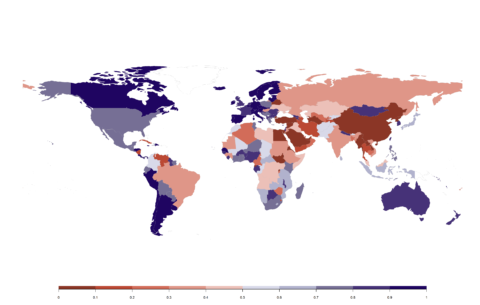New Index reveals: academic freedom is on the decline
Academic freedom is a universal human right. However, almost two out of five people worldwide live in countries where academic freedom has been increasingly restricted over the past ten years, including Brazil, India, Cameroon, Russia, Thailand, and the USA. This is indicated by the Academic Freedom Index (AFI), which is updated annually. The index is published by researchers at the Friedrich-Alexander University of Erlangen-Nuremberg (FAU) and the V-Dem Institute at the University of Gothenburg. Funded by the Volkswagen Foundation for a total of five years, the index project has been compiling and scientifically evaluating the data since 2021.
Two out of five people are affected worldwide
This year’s AFI 2022 Update shows that nineteen countries and territories have seen substantial declines in academic freedom compared to 2011. Only two have seen improvements according to the research group. Academic freedom is declining where 37 per cent of the world’s population lives – so the regressions affect nearly two in five people worldwide.
Brazil, Hong Kong, India, and Turkey saw the greatest deterioration between 2011 and 2021. However, the regressions do not only affect countries where academic freedom has not been in too good a shape for a long time: even in countries with a generally high level of academic freedom, such as Mexico, Poland, the USA, or the UK, it is coming under pressure. At German academic institutions, academic freedom continues to be highly valued: Germany received the best AFI score in this year’s survey.
The Secretary General of the Volkswagen Foundation Dr. Georg Schütte says: “Academic freedom is a precious good to which the Foundation is explicitly committed. It is a basic condition of good science. We support the Index because it makes an important contribution to ensuring that more knowledge about scientific freedom and its mechanisms of action is available worldwide.”
Data collection and the five indicators of the AFI
The AFI provides data on academic freedom worldwide from 1900 to 2021. The systematic survey is based on assessments by more than 2,050 country experts from around the world. These are usually academics who live in the country they are coding. The individual ratings are aggregated using a statistical model developed by the V-Dem Institute at the University of Gothenburg, originally used for a larger democracy dataset. The AFI itself is composed of five indicators. Each indicator captures a different dimension of academic freedom: freedom of research and teaching, as well as freedom of academic exchange and scholarly communication, institutional autonomy, campus integrity, and academic and cultural freedom of expression.
Visualisation and free use
The detailed data that make up the AFI 1900-2021 are available online and can also be accessed using online visualisation tools. The index can be used by researchers for further studies, but can also be consulted by university administrations, research funders and political decision-makers.
Find out more:
Report „Academic Freedom Index 2022 Update“. DOI: https://doi.org/10.25593/opus4-fau-18612
More about the project: https://www.pol.phil.fau.eu/academicfreedom/
A detailed introduction to the Index and its indicators: http://www.v-dem.net/media/publications/users_working_paper_26.pdf
The data are available for download at: https://www.v-dem.net/vdemds.html
For further information, feel free to contact:
Prof. Dr. Katrin Kinzelbach
Professorship International Politics of Human Rights
Tel.: 09131/85-23481
